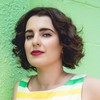Santiago Felipe / Getty Images
For me, RuPaul's Drag Race, the drag queen competition-based reality TV show that's in its ninth season, is prime fodder for dinner conversations with my friends. We often dissect the week's episode over a panino or a plate of nachos. Halfway through burritos last Monday, I had a realization: "We never see the queens eat on the show. What are they eating?" My best friend Fitz stopped mid-yucca fry with bewilderment. I realized we needed to find out.A few things we knew already: In episode five of this season, contestants discussed sensitive body image issues within the LGBTQ community: After Eureka apologized for making a joke about eating disorders, Valentina admitted, "This is just such a touchy subject for me because I do probably still have an eating disorder. Before I left [to film the show], I promised my mom that I would eat every single day. It's so hard because sometimes I feel like I'm force-feeding myself."Another contestant, Shea Couleé, also jumped into the conversation, saying, "I applaud you guys for opening up because in the past I've had a deep, deep battle with bulimia," citing beauty-standard pressures within the gay community (not necessarily the drag community) to look a certain way. "Sometimes people don't understand that, though we come across as these really strong, beautiful creatures, sometimes we're really struggling on the inside," she added.While the queens maintained that performance stress was the leading factor in their complicated relationship with food, the need to maintain an absurdly chiseled body that runs rampant in the gay male community and the pressure to conform to pageant culture's obsession with waist size were also daunting. Season six winner Bianca del Rio tells me that although craft services provided balanced meals to each contestant when they were sequestered in their hotel rooms, nerves from competing on the show sapped her appetite. "Food was never part of the show for us in general and we were all so nervous that none of us really had time to eat," she says.Then there are the cravings that seem to come with this kind of performing. BethAnn Phetamine, a queen who lives in Pittsburgh, PA, and works out of drag in the bar owned by Drag Race alums Alaska and Sharon Needles (who won season four), was all too aware of how fast food affected her performances when she lived and worked in Charlotte, NC. "You just feel like slush," she says, recalling how she and Delighted Tobehere, a queen who wasn't on Drag Race but now performs in New York City, "would eat the damn house down every time we would get back from a show. It would be double of what people should be eating."Drag icon Lady Bunny says that eating heavy meals before competing can affect how you feel and appear onstage in front of the judges. It's like "an athlete who doesn't want to have an orgasm before a game: It saps you," she says. "To have an orgasm or a heavy meal can sap your strength or quick-wittedness that you need for the game or the stage." And yet it's hard to resist such a thing after going long stretches with no food at all.Stints onstage don't justify eating three bags of fried chicken sandwiches with fries and ranch sauce before or after a show, says Kari-Claudia Allen, a South Carolina-based family practice doctor who has worked with people in the LGBTQ community, focusing on body image and eating disorders. "When you're overloading on heavy foods with those heavy oils, that is classic heart attack waiting to happen because you're just stuffing cholesterol into your body," says Allen. "If you're only expending it in short bursts, you're not complementing it with the prolonged aerobic exercise you need to stay in the healthy range of your weight and enough physical activity to counteract the food."While viewers haven't seen what the queens are eating, they've closely watched the evolving physical aesthetic that each roster of queens has had to live up to, namely cinching the waist no matter if you're stick thin or a little thicker due to a love of "a two piece a biscuit" (thanks, Mystique Summer, for the quotable.)Lady Bunny says the show sometimes implies a set of body image rules, noting that on the show (and as a drag entertainer in general), "You want to look leaner, you want to look chicer by propping yourself up on very, very high shoes. You want your shoulders to look less broad by wearing very large wigs. We cinch our waists. We make our eyes look bigger with false eyelashes. We draw our lips to look much bigger than they actually are."Allen has seen body image issues particularly impact the LGBTQ community, and pageants and competitions can either reveal or further exacerbate them. "Any type of really stressful environment can unmask anything that's underlying," she says. "When you see people in these sometimes artificial environments of stress, such as pageants or competitions or reality TV, you start to see an unmasking of things that may have already been there and a lot times you can actually see amplification of the disorder."Del Rio says that her peers haven't shared any concerns about body image issues with her, but acknowledges that being on the road just doesn't lend itself to balanced eating. "Sometimes you finish a show, and by the time you get out of the theater it's after 1 o' clock and you have a 6 am flight," she says. "It depends on what you want to eat, what's available, what's open, what can you eat… When I'm on the road, I have to get the show and I have to do the show and from there we figure it out."Read This Next: 'Bigorexia' is Plaguing the Bodybuilding Community
Advertisement
Advertisement
Advertisement
